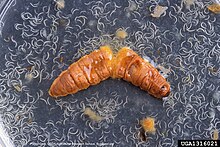Heterorhabditis bacteriophora
| Beneficial nematodes | |
|---|---|

| |
| Heterorhabditis bacteriophora nematodes emerging from a greater wax moth. | |
| Scientific classification | |
| Kingdom: | Animalia |
| Phylum: | Nematoda |
| Class: | Chromadorea |
| Order: | Rhabditida |
| Family: | Heterorhabditidae |
| Genus: | Heterorhabditis |
| Species: | H. bacteriophora
|
| Binomial name | |
| Heterorhabditis bacteriophora Poinar, 1976
| |
Heterorhabditis bacteriophora is a species of entomopathogenic nematode known commonly as beneficial nematodes. They are microscopic and are used in gardening as a form of biological pest control. They are used to control ants, fleas, moths, beetles, flies, weevils, and other pests. They are also amenable to in vitro culture, making them also of interest to evolutionary and molecular biologists who investigate parasitic and symbiotic systems.[1] Heterorhabditis bacteriophora was selected by the National Human Genome Research Institute as a sequencing target, the inbred strain H. bacteriophora TTO1 was sequenced using Roche 454 technology, and a high-quality 77 Mb draft genome assembly was produced in 2013.[2] To reproduce the nematodes release Photorhabdus bacteria from their digestive tract thus killing these pests, then using the cadaver to grow and reproduce.[3]
References[]
- ^ Gil GH, Choo HY, Gaugler R (May 2002). "Enhancement of entomopathogenic nematode production in in-vitro liquid culture of Heterorhabditis bacteriophoraby fed-batch culture with glucose supplementation". Applied Microbiology and Biotechnology. 58 (6): 751–5. doi:10.1007/s00253-002-0956-1. PMID 12021794. S2CID 23938830.
- ^ Bai X, Adams BJ, Ciche TA, Clifton S, Gaugler R, Kim KS, Spieth J, Sternberg PW, Wilson RK, Grewal PS (2013-07-18). "A lover and a fighter: the genome sequence of an entomopathogenic nematode Heterorhabditis bacteriophora". PLOS ONE. 8 (7): e69618. Bibcode:2013PLoSO...869618B. doi:10.1371/journal.pone.0069618. PMC 3715494. PMID 23874975.
- ^ "Natural pest control with beneficial nematodes". Gardeninsects.com. Retrieved 2011-08-26.
External links[]
- Leung T (2017-01-11). "Parasite of the Day: Heterorhabditis bacteriophora". Parasite of the Day. Retrieved 2017-11-14.
- Rhabditida
- Biological control agents of pest insects
- Nematodes described in 1976
- Rhabditida stubs